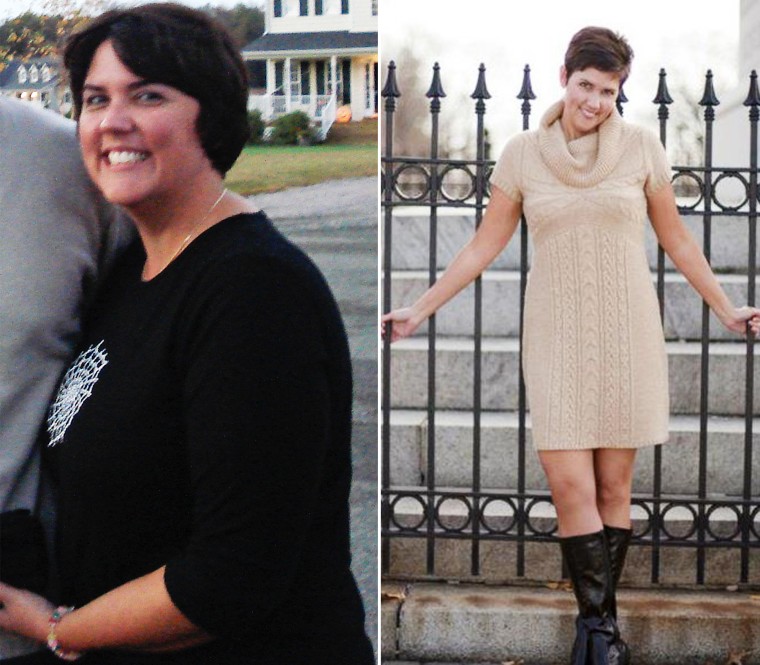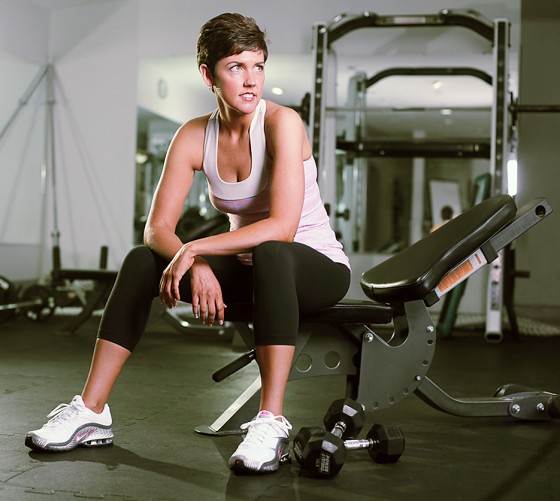After giving birth to two sons, health and wellness coach Julie Stubblefield found herself gaining weight. Years of yo-yo dieting and countless hours at the gym left her frustrated.
Then, in 2011, the Virginia mom said goodbye to dieting and began to follow her own philosophy: “Eat like you love yourself.”
“I stopped dieting and instead just started putting nutritious and nourishing food in my body as often as possible,” she says. Stubblefield dropped 20 pounds in two months.
The key to her success, she explains, was saying ‘no’ to dieting.

How diet and fitness programs work against you
Over-restricting food
The Fit Mom Revolution blogger warns that quick-fix dieting programs market self-abuse. They often urge you to reduce or cut out whole good groups from your diet, like carbohydrates, she says, which can be harmful.
“When we say we shouldn’t eat them or we should limit a certain percentage of our daily consumption or what-have-you, we assume that they are bad,” she says.
When we label certain foods as “bad,” she explains, it makes us feel like we are bad people for eating them.
“Granted, yes, some foods are not the best choices for us to have on a regular schedule or basis, but it doesn’t mean we should ban foods from our bodies,” says the wellness coach. “It just creates an unhealthy relationship with them.”
Ask yourself the question, ‘Am I eating in a way that demonstrates true, actual love for my body and appreciation for what it can do or how far it’s gotten me? Or am I eating in a way that demonstrates hate?
Being at war with your body
Diet and fitness programs can make us feel like we are at war with our bodies, according to Stubblefield.
‘No pain, no gain.’
‘Your sweat is your fat crying.’
Adages like these get flung around in gyms and stamped on fitness ads, says Stubblefield. And while they may motivate you to get in shape, they can send a negative message, she says.
“There’s a picture painted that body change should create misery and be uncomfortable and that you have to really push yourself to the point of discomfort and restrict yourself to the point of further discomfort in order to see this change in your body, and that’s part of the self-abuse,” she says.
The ‘guilty’ mindset
Many diet and fitness programs send a message that you’re lazy if you aren’t working to get thinner, which can make you feel guilty, says Stubblefield. The real issue, according to her, is that these programs set you up for failure.
“They don’t really want you to succeed because then you won’t need to buy from them anymore,” she says.
How to ditch dieting and learn to eat like you love yourself
Look at what you’re eating
The first step to getting truly healthy is to take a look at what you’re eating, advises Stubblefield.
“Ask yourself the question, ‘Am I eating in a way that demonstrates true, actual love for my body and appreciation for what it can do or how far it’s gotten me? Or am I eating in a way that demonstrates hate?”
What’s important, she explains, is to know the difference between diet foods, which are usually highly processed, and foods like vegetables and lean proteins that nourish your body.
Learn to trust yourself around food
When you try to restrict what you eat, you are engaging in controlling behavior, says Stubblefield. But when you start choosing nourishing food, you’re trusting yourself to make good choices.
“You’re going to naturally choose less [unhealthy foods] A) because you know they’re not going to make you feel as great and B) because you’re not as hungry for them, because your body is getting nourished from the other foods,” she says.
Don’t ban foods because they’re unhealthy
Convenience foods and desserts are a part of our lives whether we like it or not, explains Stubblefield, and banning them may do more harm than good.
For example, if we deprive ourselves of that pie we’ve been craving this Thanksgiving, we risk falling victim to what Stubblefield calls “food FoMo” — the fear of missing out on food. This, she warns, can lead to binge eating.
“When we come home maybe a day or two later, we’re going to end up eating something out of that ‘not good category’ to compensate because we felt deprived and we missed out,” she says.
Instead of dieting, focus on choosing nutritious foods more often
Prioritize vegetables and lean proteins consistently, and you’ll still be able to eat other foods you enjoy, says Stubblefield. Healthy eating is about finding the right balance between restricting and overeating, she adds.
“Losing a significant amount of weight or even losing 10 pounds can happen from focusing on nourishing your body with nutrient-dense foods versus over-restriction and following a strict plan,” she says.
Freedom from food
Stubblefield has lost a total of 70 pounds on her weight loss journey. She says eating like she loves herself has changed her life.
“Eating like I love myself allows me to feel freedom from food,” she says. “I don’t feel tied to eating a certain way.”
How to follow Julie's lead
- Ditch the diet brands and choose vegetables and lean proteins that are high in nutrition.
- When you choose healthier foods more often, you’ll eat less junk because you’ll feel better and fuller throughout he day.
- Don’t ban foods and don’t cut whole food groups out of your diet. An occasional dessert is fine — the key is not to overdo it.
- Instead of dieting, focus on choosing nutritious foods more often. Prioritize vegetables and lean proteins consistently, and you’ll still be able to eat other foods you enjoy.
WANT TO EAT BETTER? TRY THESE SIMPLE SWAPS:
- How to Make Healthy Food Taste Delicious, According to a Celebrity Chef
- 8 Small Diet Swaps that Add Up to Huge Health Payoffs
- Research Says This One Trick Will Help You Eat More Veggies
- 5 Foolproof Principles for Cleaning Up Your Diet
Want more tips like these? NBC News BETTER is obsessed with finding easier, healthier and smarter ways to live. Sign up for our newsletter and follow us on Facebook, Twitter and Instagram.



